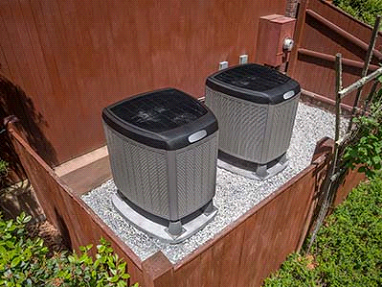How High Efficiency A/C Systems Control Humidity
 Sky-high humidity and temperatures above 90 degrees are a bad combination. Hot, sticky summer weather is a fact of life if you live in Katy, Texas. If your home suffers from high humidity in the spring and summer, a Katy air conditioning service might say that your cooling equipment is the real cause.
Sky-high humidity and temperatures above 90 degrees are a bad combination. Hot, sticky summer weather is a fact of life if you live in Katy, Texas. If your home suffers from high humidity in the spring and summer, a Katy air conditioning service might say that your cooling equipment is the real cause.
Indoor Humidity
Improperly sized air conditioning units and heat pumps are the primary cause of high indoor humidity. The surprising reason is that they work too well. HVAC systems reduce humidity by cooling air below the dew point, but it takes time for enough moisture to be removed before you will feel a difference. Units that are too powerful cool your home quickly without having a chance to first get rid of the humidity. Correctly sized A/C systems run longer and remove moisture more effectively.
Heat and Humidity
Temperatures and humidity have a special relationship. First, warm air can hold more moisture. This is why humidity is commonly over 85 percent in the summer and much lower in the winter. Second, as relative humidity increases, temperatures feel higher than they really are. In the winter, extra humidity can make your home feel warmer. In the summer, it makes you feel uncomfortable.
Even with the A/C running, excess humidity can be a problem. Here are a few signs that your home is too humid.
- – Cold and clammy rooms
- – Condensation on windows
- – Mold growth
- – Allergy symptoms
Controlling Moisture
Using an efficient, properly sized HVAC system is the best way to control excess humidity and to stay comfortable all year. Before purchasing an air conditioning system, your contractor should complete load calculations based on current guidelines. The capacity of the appropriate air conditioning system depends on the size of your home, heat gain from windows, insulation levels and other factors. The only way to do this is by assessing your home in person.
A high-efficiency A/C system that is sized for your home will have many benefits in terms of energy savings, and it will also remove humidity more effectively. Multi-speed fans and compressors allow these systems to run at variable capacities. This feature reduces temperature swings and removes moisture more effectively because the system runs longer at lower energy-saving speeds.
A few newer HVAC systems are equipped with components that can remove humidity on demand by forcing the system to run longer. Some experts say you can reduce humidity by setting your thermostat one or two degrees lower on the hottest days. However, university researchers in Florida found that this increased energy use by 10 percent and led to additional problems, such as condensation and mold.
High-efficiency air conditioners that are the right size for your home can remove humidity, increase your comfort and minimize allergies and air quality problems. Katy air conditioning repair experts and the American Society of Heating, Refrigerating and Air-Conditioning Engineers recommend a maximum humidity level of 60 percent with an indoor temperature of 78 degrees. A properly sized air conditioner along with appropriate settings can keep humidity below this threshold.
Humidity Sources
Your air conditioning contractor may recommend additional tips for controlling moisture. For example, you can help your air conditioner work more efficiently by using exhaust fans to remove steam while showering or cooking and by keeping windows closed when it is very humid.
If your humidity problems have not improved, it might be time for an upgrade. With older equipment, it is sometimes better to put the cost of an A/C repair in Katy toward the purchase and installation of a new system. To learn more about high-efficiency HVAC systems from Rudd and Trane, call All Cool A/C & Heat today at 281-238-9292.